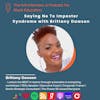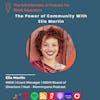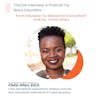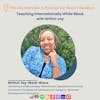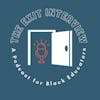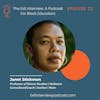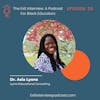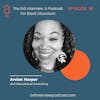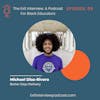
Episode 33: Healing Starts with Mindset with Michelle Emmanuelle
Michelle Emmanuelle is a former private school educator turned wellness educator, consultant, and professional speaker. In her episode, she discusses the ways she navigated pressures from administrators and students. Michelle also provides our audience with healing practices that they can begin anywhere and in any situation.

In this compelling episode of the 'Exit Interview', our hosts Dr. Asia Lyons and Michelle Emmanuelle hold a deep and earnest conversation about the experience of black educators and the burnout they face, reflected through Michelle's own journey. The episode starts with an introduction of Michelle Emmanuelle, a wellness consultant, changemaker, and professional speaker who is passionate about combating burnout. The discussion soon shifts to Michelle's educational journey, where she highlights her experiences as a French teacher and the inequalities present in the educational system. This issue particularly affected her as a black teacher in a predominantly white, private school environment. Michelle opens up about her frustrating experiences, shedding light on the discomfort, inequality, systemic oppression she faced, and the eventual burnout that led to her leaving the teaching sector. The hosts then discuss solutions to retain black teachers in schools, highlighting the importance of representation and mentorship. Toward the end of the episode, Michelle illustrates how she uses her teaching skills in her current role, focusing on assisting individuals with their mindset and overall well-being.
First of all.... have you signed up for our newsletter, Black Educators, Be Well? Why wait?
Amidst all the conversations about recruiting Black educators, where are the discussions about retention? The Exit Interview podcast was created to elevate the stories of Black educators who have been pushed out of the classroom and central office while experiencing racism-related stress and racial battle fatigue.
The Exit Interview Podcast is for current and former Black educators. It is also for school districts, teachers' unions, families, and others interested in better understanding the challenges of retaining Black people in education.
Please enjoy the episode.
Peace out,
Dr. Asia Lyons and Kevin Adams
Dr. Asia Lyons: All right, welcome back everyone to another episode of the Exit Interview, a podcast. For black educators, my name is Dr. Asia Lyons. My co host Kevin is probably playing with his band Somewhere and we're going to support him But we have a special guest on today and I'm gonna read her bio before we get started Michelle Emanuel so meet Michelle Emanuel a wellness consultant change maker and Professional speaker who supports individuals to live a life beyond burnout Which we love on this podcast.
Her unique insight and practices empower resilience and serve as an agent for sustainable change. Sought after globally by diverse sectors of business such as Cisco and the NAACP, Michelle has over 15 years of experience in education, coaching, and consulting. Her clients consistently applaud her creativity, authenticity, and ability to create safe spaces.
When she is not helping others [00:01:00] to live a life more balanced, Michelle can be found indulging in fringe conversation, dreaming up her next travel adventure, hiking, dancing, and enjoying good food with good people. Michelle's philosophy is that change only happens when it is sustainable, embodied, and accompanied with ongoing support and accountability.
Some of her trainings and certifications are somatic coaching, healing race based trauma. Somatic stress and anxiety release over 500 hours of yoga and neuroscience of healing. Wow Welcome to the show Michelle
Michelle Emmanuelle: Thank you so much. Nice to be here
Dr. Asia Lyons: Yeah, of course Michelle and I met because we're both schmilly's so out there for folks who don't know and I've always talked about this I read this book a while back.
We should all be millionaires by Rachel Rogers and Join the Facebook group where Rachel and her coaching folks [00:02:00] go on and support women specifically, everyone who's invited, but mostly women on their business journey. I believe we had a conversation in the DMs and so we connected several times and we finally decided it was time for her to come on the podcast.
So I'm so excited to chat with you and to have you share your story.
Michelle Emmanuelle: Thank you. Happy to be here. Yeah. Happy Sunday. Yo, thank
Dr. Asia Lyons: you. Happy Sunday.
Michelle Emmanuelle: It's beautiful here in Denver. Tell us where you are. I am in San Francisco and it's actually, it's raining. I almost said snowing, which nope, not snow. It's actually raining but still pretty nice temperature wise, like in the 60s.
But it's one of those rainy Sundays, which is fine. Yeah.
Dr. Asia Lyons: We yeah, we don't get too much rain here. Fortunately and unfortunately, because it gets super dry, but yeah, we're not here for me, so let's get into it. You talked about, in your bio, you talked about involving or indulging in French conversation.
You were a French educator. Tell us all about that. What made you [00:03:00] decide to become a French teacher? What's your journey?
Michelle Emmanuelle: French is my first slash second language, and so I It felt like a natural transition to get my degree in French. And education was something that I thought I thought of hey, maybe I'll be a translator at the U.
N. and all these different things wow. In the end, I just thought, I'll do, I'll be a teacher, and so I decided to get my credential in French, to be a French teacher. At the time, I was also teaching French and English because they needed a dual language teacher at the time, that's the short version. There's much
Dr. Asia Lyons: more of it. Yeah, so you tell us, we love the long version here on our podcast. I don't think you are talking too much, but what grades did you teach or did you teach in higher education? Where? For how long? We love the details.
Michelle Emmanuelle: Okay. So I started out in middle school and then my, so the English classes were in middle school and my French classes were high school level.
And I also, excuse me, taught [00:04:00] I was a yoga and wellness fitness teacher at a high school in Oakland for a little over a year as well, just before the pandemic. So most of my classroom teaching experience would probably be mostly high school age, but I started out with the middle school age with the English classes.
Dr. Asia Lyons: So between the, I'm going to take a guess it was French, but between the English and the French classes and between the two different grade levels, which would you, did you like the most?
Michelle Emmanuelle: I like them both for different reasons. When I first started teaching, people were like, Oh, middle school.
Oh, I thought they were fun. I like them. I feel like they're like that sweet spot, where they're like still little kids and, they'll listen to you, but they're also old enough to like, grasp More con more complicated concepts and conversations. I enjoyed high school because they're just getting into that age where they're starting to figure things out, and also they're still goofballs.
Sometimes high school has, too cool for school attitude, which I, that's not fun to teach. [00:05:00] But I, I just found that each grade had something that I really appreciated, but I think I was more pleasantly surprised by middle school because I was there. Warned against it by so many people like, Oh my gosh, good luck.
And I thought, what? This is fun. What are you talking about? So I think it really depends on the person,
Dr. Asia Lyons: yeah. I taught middle school for six years and we have folks on the podcast all the time who taught middle school, seven, eight or sixth grade. And we did the same thing. Folks who are meant for middle school.
We loved it or love it. I always say I have a K six license that I think is expiring probably this year. But I taught 6th grade and really enjoyed it, especially because it felt especially in the beginning of middle school, it felt like my 6th graders were big 5th graders, right? And they still really wanted to work really hard to please their teachers, to do the thing.
They weren't too cool yet. It wasn't until the end of 6th grade. Yeah, it wasn't until the end of 6th grade, beginning of 7th, when we started to see that Teachers aren't cool [00:06:00] anymore. It's just about my friends or my, whatever, which is developmentally appropriate, but yeah, I never had any complaints about about teaching middle school.
Michelle Emmanuelle: Yeah, I hear you. I think it's case by case.
Dr. Asia Lyons: Exactly. So you, how long
Michelle Emmanuelle: did you teach? Let's see, off and on I probably taught a total of, I say off and on because, when I was teaching that time period with English and French, I stopped teaching and then, sounds odd, but I stopped teaching so I could become a professional dancer.
And then I went back to teaching. So I would say the total amount of time that I was in
the
Michelle Emmanuelle: classroom teaching was about Three and a half years, the half years during the pandemic and I was released from my position. .
Dr. Asia Lyons: So that gets into that conversation of what made you decide to leave education and so you said you were released from your position.
Is it because of the pandemic?
Michelle Emmanuelle: A two, a couple things. First, I realized that when I was a classroom teacher, full-time at a school, I. [00:07:00] I realized that, while I loved teaching, I wasn't necessarily crazy about the system, the educational system. I found it really problematic, especially as an English teacher.
I just felt like a lot of people were falling through the cracks. And, the load that, and the requests and the obligations on teachers, I just felt was unreasonable. And, in proportion to the pay. I just felt I actually was working at a private school at the time, too.
And I realized that while I, and I still incorporate teaching in what I'm doing now, but I left teaching at that particular time because of what I call the three P's. The parents, the politics, and the paperwork. As an English teacher, I just felt like I was inundated with this grading constantly, and it wasn't even my forte, because I wanted to be the French teacher.
But, because I was at a private school, I ran into some very challenging situations with parents. Feeling very entitled, and being told that, [00:08:00] they are paying my... paycheck, and I need to listen to what they have to say, and I ran into quite a lot of racism. Pretty bad. I just felt you know what?
No. That's one of the things, but I actually really do love teaching. I think it's actually one of my natural gifts. And I'm happy that I've, when I did go back into education, that's why I went into It as a yoga and wellness teacher because I wanted to do something more sustainable and that was actually going to support people.
And also, so I was still within the educational system without necessarily having to be so restricted in terms of how I was doing the work that I was doing.
Dr. Asia Lyons: Yeah, that makes sense. When we talk on the show, on this podcast about the labor the labor of being an educator, that's one piece of it.
But we also, we very much talk about, and mostly what we talk about here is that second layer of showing up in like a black body and having to navigate the racialized pieces of the world, [00:09:00] right? And saying it's not just being a teacher that's hard, it's being a black teacher, specifically for many of our guests, black women who have to navigate this space.
Some of them have been in private schools, some in public, some in whatever different spaces. And it was really challenging. And it's, It just chose, it taught them that wasn't the place they wanted to be, is in like this type of traditional classroom space.
Michelle Emmanuelle: Absolutely. Absolutely. That was definitely my experience as well.
Yeah. Yeah. Unfortunately.
Dr. Asia Lyons: Yeah, super unfortunate. When you were experiencing, share as little as you like, as much as you like, no pressure. But when you were talking about your racialized experience, did you, we find that people talk about They share with their family members, or they process it through with someone.
When you were having these experiences, was there people that you talked to about the situation, or did you internalize it? How did that work?
Michelle Emmanuelle: Thankfully, I was able to have a conversation with my mom. And there is a [00:10:00] specific situation that happened. I was teaching a particular, in my English class, I was teaching a particular book.
And there is a reference to the deep south. And the racism and, some references to the enslavement of black people. And they had a paper that they needed to do. My mom she's passed now, but she is originally from the South. And I thought, this is great, I'm going to have her, be interviewed.
I set up this thing where the class could, ask her questions about her time growing up in South Carolina, and I got so much flack from the administration. And one woman actually insisted that her daughter write a, the paper that she turned in on slavery was about white people, white slavery.
Super off topic of the book. And it was ridiculous. And I, thankfully I had a rubric. And she just basically didn't follow anything, so I failed her. And of course, the mom was like, Oh, this is racist. I'm like, Okay, whatever. But the administration [00:11:00] got in and they were, because this parent was, a big stakeholder in the school, the administration was like basically telling me to let her do the paper again, or change the grade.
So we were in this big conference and with the parent and the administrators and they were hinting and so I just called them on it. I said, so let me just clarify as my supervisor. Are you telling me? to raise the grade. And if so, what grade do you want me to raise it to? And so we can all make it clear that's what you're asking me because I'm not clear.
I said, I feel like that's what you're saying, but not saying it. So I would like you to specifically say, are you asking me to raise her grade from an F to a C or would you like a C plus or B based on this parent's request? What is it that you want me to do? That was like naming it. Listen, let's not play, and everyone's asked. Uncomfortable and everything and they're like how about allowing her to do the paper over? And again, because I had a [00:12:00] rubric that outlined, how the paper was being graded I showed that she covered none of it and I said Let me understand why she gets the justification of having another chance at this when I explained it to the entire class She was present.
She was never absent and the assignment was clear, why should she get to rewrite her paper as opposed to no one else and this paper that's on, off topic, and so I'm like, again, and they couldn't really justify it. So I, but they're wanting me to do it. I said, so again, as my supervisor, are you actually telling me to do that because you have the authority to tell me to do or are you, Telling me, what's the outcome that you want from this meeting. So I was just nailing them, I'm like, don't play. But they weren't, finally they were like and they hemmed and hawed and everything, but I basically held my ground and I
allowed
Michelle Emmanuelle: everybody who didn't get, a passing grade to redo it.
I wasn't going to give her preferential treatment. I'm like, either everyone does or no one does. And I said, and I get an assistant to [00:13:00] grade because I'm not going to regrade all this. I don't have time. You know what I mean? But anyway, it was ridiculous,
Dr. Asia Lyons: and it sounds like you say, this is that was one of many situations I want to.
This is such an interesting story because there's so many folks who have similar experiences, right? And this idea of I'm going to assume that your heart was pounding. I would have been, like, saying the things, but in my mind everything's happening in slow motion. And still saying this has to be said.
And it's very interesting that the The principal, the administrators are asking you to do these things, but not wanting to say it out loud. And we were talking about me and a good friend, Dr. Desa Daniel, have been talking a lot about the default characteristic of America is niceness, right?
And you weren't being nice by making them say. That they wanted this grade to be changed. You weren't being nice by saying they had to rewrite the paper over [00:14:00] again. You're supposed to figure that out so that they're not uncomfortable in their whiteness and you're supposed to and you're forcing them to say things out loud.
And that's not nice. And in America we are nice or you are punished, right? It is so true, right? So that's been something we've been talking a lot about. And now that, We're having this conversation, they said, and I it just pops up so much about this expectation of dice and the fact that even going a step further and saying that this parent obviously thought you weren't being nice by hurting her child's feelings by talking about enslavement of Africans, right?
That's not nice. So as the retaliation of this, I'm going to show white violence by submitting a paper on white. Slaves or whatever that was. So it's just that's all the pieces. Yeah. Yeah. Thank you for sharing
Michelle Emmanuelle: that story. You're welcome. Like I said, one of many. And as an administrator, I was [00:15:00] working at another school, which I forgot to include my educational background for a time, also a private school with no scholarship.
So the demographic was primarily white with a sprinkling of Asian. And I was the only black person on staff. And it was, that was hugely problematic. And because it was a private school, they happened to be open on Martin Luther King Jr. 's birthday. And the first, I worked there for a year and a half, and I was like, I'm calling in sick.
I was like, I'm not going to be here, and then we had a moment when One of the, this is an interesting situation where, 'cause this private school was owned by a corporation and and it was, it's a national school, so there are many different schools and across the nation and the CEO was making rounds to the different schools.
And it came up in our meeting, about why this holiday isn't being acknowledged. And my the director of the school literally told me, don't rock the boat. And I was quiet, [00:16:00] and I wasn't quiet in compliance. I was quiet, just whatever, girlfriend, I'm going to do what I want. Yeah.
And in the meeting, it turned out that, somebody else, one of the other teachers actually asked, why are we open on this holiday? And his response was, oh, when we were putting the school calendar together, we were just finding the days to align with the public schools. And, we just didn't realize.
And, she said it's a national holiday. And he's yeah we just didn't realize it. And then I wasn't being nice by asking that. Yeah. And so she really didn't like it. And she was getting all kinds of snake eyes from the director. She dropped it, I didn't know.
I go, but, and this, I said, but I tell you literally the director, like palmed her hand on her forehead. She was just like, Oh, she just looked down and shake her head. Cause I was like, no, I'm not letting this go. If I don't speak into that, nobody will. So I just said, I. I said, how is it that we have all these tenants of the school that actually represent Dr.
Martin Luther King Jr. 's, accomplishments, and yet we're open on his birthday, on this [00:17:00] national holiday. I was just calling them out left and center. And, finally he, I have to say, I'm happy to say that they did change the policy. But the thing is, I was reprimanded after that meeting.
For quote unquote Of course. Causing problems, and I was just like, you know what I'm not I, same thing. There are times when there, there's this meme that was another employee sent out an email for happy hour. And at the time there was an altercation in a black neighborhood and a woman is interviewed and in the interview she said ain't nobody got time for that, and it became a meme.
And then, so this invitation for happy hour was. It couched in this, let's go to happy hour because ain't nobody got time to, to not go or something like that. And I was like, what? And so I called that out. I said, I walked into the director's office that morning after I saw the email and I said I would like to call an all staff meeting and I went, I wasn't asking.
I was like, I'd like to call all staff meeting and I'll lead it. And here's what I'm going to say. I was a thorn in her side. She was so [00:18:00] excited when I quit. Like literally she was like skipping. Yeah. I just called the staff out and I said, this kind of thing is inappropriate and unacceptable.
How are we as educators modeling this? And people are like, yeah, I saw the email and I was all uncomfortable and everything. And I said, here's my issue is that. I am the only one speaking into it and all you all are silent and complicit and then you're going back into your classrooms and teaching the next generation.
I said, what are you teaching them? So I was all about, and then same, another thing, the last one, but I was walking by, I was walking by the history teacher's classroom one day and his door was open. just in time for me to hear him say, every single person in the United States immigrated here, we are all immigrants.
And I just stood there and looked at him and I said, Mr. So and I said, everybody? And he goes, everybody. And I said, really? And I was just waiting for him to recognize me as a black woman standing there talking to him. And then one of the students was clearly like picking up, where I [00:19:00] was coming from.
And he goes Mr. So and Do you mean, the black people, too? And he goes, oh, and his eyes got saucer big. He goes, oh not, yeah, okay not everybody immigrated here. And, and I'm like, dude, listen, this, here is this, grown man standing in front of the classroom, apparently teaching, educating, quote, unquote, and yeah, there were quite a lot of heavy lifts, being the only at that particular school, that I was just, Constantly, I was the thorn, in administrative meetings, there's always this and let's see if we can all, comply with what we're trying to do and, looking over at me and I was like, whatever, but I was just like, listen, I'm not gonna work here and be quiet.
That's harder. You know what I mean? If they want me to be, treat me like the troublemaker, then, at least I am speaking the truth and not letting things slide. But it just got to be, I did, I left there for other reasons. My dad was, very ill and I needed to make sure I was available at that time.
But it was also clearly not a fit. Yeah. It was just [00:20:00] like,
Dr. Asia Lyons: oh gosh. It's interesting because I know that people on listening, some people who are long term listeners are going to, or long time listeners are going to say they hear the story and they hear their themes. And there's going to be folks who listen to this for the first time and say if she was in a public school or something about something, inner city youth, or that's why such and white people.
And I just want to say that we've had private school folks on here. We've had public school folks on here. We've had all types of three years of experience, 30 years of experience. And the story is the same inner city working with non black leaders. who are also non white. The story is the same, right?
And that's super unfortunate because always the kids miss out. And it's interesting that you're saying that, you left because your dad was ill and you wanted to make sure that you were, by his side if he needed you. And then my question is, like, how long do you think you would have been able to go for?
Doing that constantly, showing up and [00:21:00] advocating that way. How long, and I know this may not be easy to answer necessarily, but do you feel like it? You could have kept going for the five, 15, 10 years, 12 years, or did you just know if my dad was in good shape and he was well, maybe I would have finished a year and then went on to something else.
Michelle Emmanuelle: Yeah I would have definitely finished a year and then moved on. The school itself is excessively toxic anyway, my experience was. Toxic and the extra of being a black woman in the only, in this particular environment. But, my preference would have been to finish out the year, but at the same time, the stress and the anxiety that I was feeling, which is honestly why, like I talk about burnouts, it's I remember all these different things and recognizing oh my gosh, I was.
Basically feeding into it, once I understood how burnout worked, I was like, Oh my gosh, no wonder I was so exhausted and fried all the time, but it was taking its toll on me health wise. And, it was, I don't know that I think there was [00:22:00] definitely a grace in me leaving sooner for my own mental health.
Dr. Asia Lyons: Yeah. I want to mention one more thing before I move on to the next question. And you've talked about being the only one in the school. And like the, that isolation, right? And I was the only one in the school for a while, and then I became one of two, then one of three, then back to one and, and folks would come and go.
And it was super hard, and very lonely, and I think that people don't understand, for some of us for when I was working, I loved my students, and I stayed for my students. But I did spend a lot of time in my classroom by myself just because of the endless white chatter. That's the only way I can describe it.
Yeah. It's just like the endless white, like anxious chatter. I get that. Yes. I know you do. I know you do get that right. And it's like no space for anything but. What they're talking about [00:23:00] and their lived experience and what it's just like no room for anything else, but they just take up all the air in the room and not consider any other perspective, but their own and think that and assume and at least in my experience that we're all in solidarity because like we're all teachers.
So we all must have fill in the blank fill in the blank, especially in Denver or Colorado area. I didn't teach in Denver necessarily. We thank you for sharing that. And so that kind of goes on, yeah. It goes on to my next question, which is you were not an educator for a very long time, which is totally fine, but in your observation of your experiences on the back end, and just while you were experiencing it, what do you believe that school districts, unions, higher education can do To retain the black teachers that they have and I'm very specific when I'm saying retain versus recruit Because we're really good about [00:24:00] recruitment going to HBC use And paying people to move moving bonuses and all the other things to bring new black folks into a space But what do you think that folks should be doing out here even you know?
Families even of students, what they could be doing to keep black educators healthy and they can't determine that, but you understand what I'm trying to say. In their
Michelle Emmanuelle: school spaces. You're right. I haven't, I'm not one of the 20 year veterans in education. However. The time that I was in education, I had the opportunity of being both a classroom teacher and an administration for a time, so I got a chance to see both sides of things.
And one of the things I think is really important is representation in high leadership positions. I think that makes a huge difference if there is somebody, a black person who is a principal, who is, in a powerful decision making position, [00:25:00] because then there is a chance to actually feel more seen and heard, and also just recognize okay, you're not the only.
But also, that shows that there's a value, that school values, the diversity aspect. They value black power, the black... People in powerful positions, and and it's not just, you're only a teacher, and to get into those higher administrative positions, you have to work three times as hard, or whatever, but I think, there has to be a value system in place, and that value system has to go beyond, as you said, just the recruitment, that the, like a friend of mine, and I also have read this somewhere, she says, The diversity part, it's easy.
It's the equity part that's a challenge. You can get diversity as you said, HB, go into the places where the black folks are, you can recruit all day long, so boom, we're diverse, but what happens after that? So I think that there really needs to be a foundational value that's recognized and implemented and is, has some kind of accountability, and mentor programs, because just [00:26:00] recognizing I had people who were helping me and supporting me as a new educator.
However, they were white, and so she was helping me in my subject matter, but Things I was running into, she, as a white woman, she couldn't speak to, so I think there needs to be also some kind of availability to have mentorship by, like for us, by us kind of thing, you know what I mean, that who recognize the challenges and that we can go to these different, maybe even just like professional development specifically for black educators.
Maybe that exists. Again, I haven't been around in the educational system long enough to speak, Whether or not that's actually in place or not, but I think that, I know that when I was working in Oakland, there was something like that, and it was very powerful. There were two opportunities to do that, and it was just for the black teachers, and I remember people coming back feeling so much more empowered and seen and valued and heard and recognized.
And it created a sense of solidarity, too. And for those who are not in a space of having enough diversity for there to be [00:27:00] solidarity, maybe they're the only one, at least they know that there's a connection someplace where they can go to get support, so something like that is just, I think that's vital.
Yeah,
Dr. Asia Lyons: I love both though. Representation, high leadership positions, mentorship programs for black people, by black people, with black people. My, my first year teaching, I had a mentor who was assigned to me at the, from the school district level. Her name was Sandy Mason. She's a black woman. She is a black woman.
She's still alive today. And I didn't realize until I think just at this very moment how rare it is for a black person in my school district to have a black. Mentor because it's very at the time was very hard to get into that program like people didn't necessarily rotate it out But there weren't enough black people in the that mentorship program for us all to have dr Mason and so I wonder [00:28:00] who made that decision to put her with me right and whoever that person is I'm super grateful because she was amazing and Yeah.
And I also I totally hear you about the representation of high leadership positions. What I'm finding on this podcast and also unfortunately within the black educator wellness cohort that I run with my co facilitator, Dr. Ellie Cahill, is that our black educators who are administrators now are getting burnt up nonstop, right?
And it's even because now a lot of them are out of the union, they're no longer able to be a part of the union as administrators, they're not protected by that. And when you're put into a space, some of them, where the parents are white they're the community gangs up, and I'm using that word intentionally, gangs up to mob that educator, that administrator and push them out.
Yeah, and I've seen it so much [00:29:00] where folks will say, I don't know why they put her in that school. They know the two principals ago, they had a black woman there and they know what the community did to that person, right? And so you see in folks who are excited to be administrators or were in a school for a long time doing really well, just all of a sudden get moved and don't last in the district after that, right?
And that's not just in the district that I was teaching in. It was lots of different districts, even just recently, just reviewing some of the like educator wellness cohort applications for our next cohort. We read one of the applications and it was an administrator and one of the questions in our application is like, why this program?
And she just said, because I really need it, like period hard stop, enough said. And yeah, and I'm a totally in agreement, agreeance with you. But back to what you said, the value part, right? Are they value? Are they heard or are they just another token person so that people of color, [00:30:00] specifically black women can feel like, Oh look, we have such and such in that position.
We all flock to that school. They move them. We're stuck over here and a system and a cycle starts all over again. So yeah, I a hundred percent agree with what you're saying. And I wish that more school districts took those suggestions seriously. And then look after these folks who are protecting black teachers.
You know what I mean?
Michelle Emmanuelle: Yes, absolutely. Yeah,
Dr. Asia Lyons: thank you. You mentioned this just a moment ago. At talking about like why, like now you understand burnout and how you're using that in your work. So that's the question, my favorite question to ask. It's because, and we emphasize the question of what are you doing now because We want folks to know that there's lots of ways that we can still heal and support community work with children work with adults or whatever And do the good work and not have to be in a traditional classroom space.
So Tell us what are you doing now that you've left the classroom? We want to hear all the
Michelle Emmanuelle: details [00:31:00] Okay. Yay. Thank you for asking. I am, I call myself a wellness consultant. Basically, I focus on the holistic well being of individuals. My emphasis is on stress, anxiety, and burnout prevention and support.
And when I first got into this, I was, using my teaching skills to do one on one coaching. And because of the nightmarish... Administrator that I had, I wanted to focus on women executives because I thought, you know what, they're the last people who take care of themselves and the first people who need it, and I also saw that how this one woman was basically, it was a top down disaster, because she was so many things and I just thought, wow, if she's resourced, if she has the support she needs, she could be an amazing person and the retention level would go up and all the different things.
I basically transitioned from that as I started learning more and more about burnout. The, [00:32:00] what differentiates me and everybody, burnout now is not even such a buzzword because it's pretty, it's been around for a minute. But what differentiates me from what other people do is I focus on the causes of burnout.
Because burnout is like a giant bucket where everyone's just oh, I feel burnt out, I'm exhausted, I'm stressed, blah, but there, I, Through the different research that I've done and books read and all the different things, there were seven different areas of burnout that were identified.
Like physical, mental, emotional, social, creative. All the different things. I actually added number eight to my disclaimer. It's not scientific, but it is straight up scientific. Fact. The number eight type of burnout is due to systemic oppression. And you, if you talk about the average white man who is stressed and anxious and burnt out working 80 hours a week, and he literally is burnt out, you put him next to anyone who comes from a marginalized or historically excluded background, that person's gonna be the same level burnt out in terms of all [00:33:00] those same areas.
Emotionally, mentally, physically, et cetera. And then some, let's add the extra the having to navigate daily the microaggression, suspicion, assumption the lack of acknowledgement, representation, equity. All of the extra that people, specifically black folks have to navigate on a daily basis goes into a person's nervous system, which means that the amount of burnout.
That happens is extra. And so statistically, black women rank the highest when it comes to burnout because of that as a woman and then being black, so it's just like all the extras. And so for me, I've been focusing my, the offerings that I have currently is I do workshops for organizations to help them to have cultures that are Basically supporting their people to thrive, and so what I work with leaders and organizations and a lot of times I tell them, it's expectations for your employees is [00:34:00] absolutely fine and normal.
However, when there's an expectation, there needs to be a support system to go along with that expectation. If they're expecting this person to perform at this particular level, how are they supporting them to actually do that? They need to have some kind of support system. That support system also looks like recognizing a person's well being.
And a lot of times when I talk to people in different organizations, I talk to them about recognizing that eighth type of burnout, which is due to systemic oppression. And, I don't, I have talked to, I have a lot of pictures. Friends who are DEI consultants who are out of a job now because it's not so popular, unfortunately.
And I'm still, for me, it's so like I can slide in to the wellness angle. It's just recognizing, listen, if you are actually wanting to support your diverse culture, you need to recognize... That this is an element that impacts the culture, that this type of burnout is actually impacting the culture, not just, those of us who come from a [00:35:00] black or African background, but, all the different places of marginalized people, how that happens.
For me, the more I started learning, the more I started recognizing that I really wanted to have Some area that I specifically do just for black women. I do group coaching specifically for black women. And also teams. It looks like a couple of different ways. Periodically I'll have on my website, Okay, a new group coaching is starting November whatever, and if people want to join, that's great. But there's also an opportunity if, there are like some black women. Or, even a team of people who are like, you know what, let's, it'd be great for our team to have group coaching. Then I also do it that way, so it's more like the curated. If a person's me and my six friends want to do this, or me and my five friends, or whatever, then, yes, that's an opportunity as well, so it's more curated and already a sense of community and connection with the people that way. [00:36:00] I also, I have a soft spot for educators, so when it, and there's a price on my website, if they're in education, I'm also recognizing you know what I'm happy to work with what you can do too, sure, yeah, sure. Because I'm not trying to, I want to be accessible but at the same time, where it feels fair to everybody, I don't typically announce that a lot, but because this is a specific for educated podcast, I wanted to say that, I definitely do try to work within the, what people can do so that they can get the help
because
Michelle Emmanuelle: burnout's real and it's, a lot of times what people don't realize regarding burnout is what happens many times is people quit because they just can't anymore, so what I try to do is support people and help them to recognize that. Some people don't have that luxury of just quitting. You know what I mean? It's hey, bills still need to get paid. They can't just I'm out. Even though their body is saying to do that. So a lot of, what I work from, like my foundation, my baseline, [00:37:00] is the sustainability of things, and what, and that's why I call my website Sustainable Changemaker because, change isn't change unless it's sustainable. And what I try to show people, and this is probably part of the most challenging part about, in terms of helping people to understand this framework. Because when a person is filled with anxiety and stress and they're burnt out, the idea of adding anything else to their schedule, even something that's good for them, like this hour of coaching, is just oh, I can't, I have no time, there's just no way, so I start with a reframing of you listen, creating, this hour is actually creating more space, and although yes, it looks like, there is something that they need to add this one hour, but in this hour, the value that they get in this hour is powerful because in this hour, this, I start with mindset because what happens a lot of times when people feel anxious and burnt out, the [00:38:00] mindset is the first thing that starts telling them like, Oh man, I can't do this anymore, and they don't have the opportunity to really do the things that they want to do, because they feel like they can't anymore.
And so I feel like the first thing I try to tell people is it starts with our mindset. And so what I tell them is that anxiety is often an over exaggeration of a threat, and an over Underestimation of your ability to cope. I'll say it again, please. Yes. Anxiety is often an over exaggeration of a threat and an under estimation of your ability to cope.
The more we focus on being anxious and stressed and burnt out, that gets bigger and bigger. And then our sense of ability to actually deal with it gets smaller and smaller. So it's almost like... We're looking, we become this tiny little person and the anxiety is this big giant that's about to step on us, and so that's why I start with the mindset, just helping people to recognize like, listen, he first let's just talk about [00:39:00] what's real, and that, what's happening in the mind because the mind is already spinning up because it's out of balance.
I can go on and on about, but basically, for me, I support helping people to reframe what's going on in their mind, helping them to find the physical practices that help them to actually find some sustainability in their health and their well being. And a lot of times I tell people when they're talking about, I don't have time to do this and that.
I have the 30 second practices, the one minute, the two to five minutes just to show them that. A person can actually regulate and calm their nervous system, which basically means ease away some of the stress and anxiety in 30 seconds, in 60 seconds, in 2 to 5 minutes. That's part of the reframing that I work on in the group coaching, is helping people to recognize, oh, there is time, there is an opportunity, it is accessible.
Because a lot of times people feel like... I don't have time, so it's not [00:40:00] accessible, it's not attainable. And those are the two areas I start with. It is accessible, look, you have 30 seconds. You can do a 30 second practice while you wait for the microwave. You know what I mean? Listen, I'm not even asking you to put, add anything into your life.
It's integrating these into the moments in your life. You know what I mean? , we all have 30 seconds, we all have 60 seconds. I call 'em, in between the Zoom calls, the two to five minute ones, for if a person's working online. Basically just helping people to see like the accessibility of things by look, you feel better, those 30 seconds.
How do we start creating that into habit, so the physical practices and then the sustainability. So it starts with the mind, then the body, and then how do we make it a habit, so it becomes their holistic wellbeing. I love
Dr. Asia Lyons: that. I love that. And I did write that down. Because I know that there are folks again who are like, what do we need to do?
And that mindset piece is huge, right? I know Kevin and I talk about this a [00:41:00] lot that yeah, people can't leave. Kevin is an administrator. This year he became an administrator in a public school near us. I left teaching in 2018, right? And I was one of those come hell or high water folks. But, Also living out a privilege of having a spouse that could take care of some of the bills.
And also, my child was fairly young so we could figure some things out. But there are people who are taking care of themselves or other, or children. Or my favorite thing people say a lot is I only have five more years and then I'm getting out of here, right? And so what does it mean to not just like barely make it, but really thrive?
And those five years so that they count for something because we assume that we're going to live that five years. We won't die at our desk, like literal, right? Can you walk us through a 30 second reframing? I'd love for the audience to to have that tool in their tool [00:42:00] belt.
Michelle Emmanuelle: Sure. I'll do a 30 second mental one.
And this is basically having a moment of awareness. At all times in our lives, whether we realize it or not, we are asking ourselves questions. How do I do this? How come this is happening? Why can't I do this? What's happening now? Da. We're always asking ourselves questions, a lot of times when a person is feeling stressed and anxious, they're asking themselves, What if this happens?
What if it doesn't work out? What if I can't? What if, a 30 second reframing that I like to offer is just simply What if everything you've been worried about works out great? Basically just reframing it to a place of positivity. And it's not Suzy Sunshine okay.
But there is scientific proof that what we think about we manifest. You know what I mean? If a person it's if I say, okay, Dr. Hazard, don't scratch your nose no matter what. All you're thinking about now is that I told you not to scratch your nose and at some point you're going to, even slide.
It's huh, there's something. Super simple example, but at the [00:43:00] same time it's just recognizing that, when a person is in that stress and anxious place, what they're focusing on is what's causing them to be stressed and anxious. Yeah. All the time. And like I said, lived it, been there, daily.
I still have my own practices. So the 30 second practice I like to encourage people is for 30 seconds, write down, what if dot, and then something positive. Whatever that, that stresses on their mind right now. Oh my gosh, finances. What if I have all the money I need? What if...
And you know what, you're just writing that down. And what I usually do is have people do a little check and like, how are you feeling before and how are you feeling afterwards? That, just that practice of actually reframing like, Oh, there's a possibility that things can actually be better. And that's the thing.
When a person is feeling stressed and anxious, they get in a, like a, their narrative becomes like a single focus. And the idea that there can be any possibility. And room [00:44:00] for expansion and something new and better becomes so limited. And so this is a simple exercise of helping people reframe that and it's Oh, and I was working with this organization and this woman, she forgot to mute herself.
And I had a list of things to help people get started. And one of them was, I was like, what if everything that I'm working, that I'm so worried about works out? And she said, Oh. She just had this physical Oh God, and just the idea of me saying that I could hear this sigh and, and this was on zoom.
So I saw her body relax and just because I said that, and so our mind, we can think ourselves into something, in a heartbeat. If you start talking about someone who like. Really, it made you feel angry, and you start talking about it all of a sudden, you're riled up again, it's true. But then you talk about your best day ever. You're reliving that. It's oh yeah, that was awesome. You know what I mean? It's what we focus on. That reframing of just first of [00:45:00] all, recognizing we are always asking ourselves questions. And what if? This is just one of the questions.
What if? And then put something positive. Whatever the stress or the anxiety is, maybe it's just focusing on that one topic. Let's talk about, money. Okay? And a person's just having some financial challenges. What if I have all the money I could ever possibly hope for? What if all my bills are paid early?
What if I am debt free? What if I receive a raise? What if money comes to me unexpectedly? What if I can invest, in my child's, future? What if I can actually buy this, so it's not just, unfortunately, money gets far more focused than it needs to be because, it's our form of trade, for whatever it is that we need.
But the idea is this this is another tangent, but I just need to say this, finish this thought is that I'd like to encourage people to in terms of reframing this mindset is that money is a resource, not the source.[00:46:00] And a lot of times when people are feeling stressed and anxious about money, it's because they're thinking that's the source.
And if they're thinking, Oh man, this position or this whatever, or this, you name it, they're thinking everything's banked on that and it's not, it's a resource like air is a resource, water is a resource. We need that just as well. So again, there's power in the reframing and that's why I start with that in the group coaching.
Because, it's where change starts. Oh man,
Dr. Asia Lyons: I love that. Before we move on to our last question, tell us the website or how they can get in contact with you if folks are interested.
Michelle Emmanuelle: Yeah. Absolutely. So again, my website is called SustainableChangeMaker. com Awesome. Yes, and that's the best way to get a hold of me because you can see what I do.
There's a section that talks about the workshops. There's a section that talks about the coaching group coaching. And [00:47:00] again, the group coaching can be, curated. You and your, five girlfriends or whatever. Or, I'm not sure if I'm going to be starting another group coaching, on my own this year.
Because the holidays are coming up, and because the holidays are coming up. I'm feeling like I should
That's why I'm like, huh, so I'm sitting with that I'm very open to doing that and you know what people have something to say about that Let me know because I'm literally sitting on the fence with that one like yeah, but anyway that Go ahead. I'm sorry. Oh, I was just going to circle back and say, that's how people can get ahold of me.
The best way is through my website, sustainable change maker. com.
Dr. Asia Lyons: Thank you. And I want to say that maybe having a session over the break over winter break for teachers or whatever, it might be something that makes sense because I know so many folks are like sprinting towards this time only have so many days.
Until thanksgiving break and then after that two weeks and then i'll be off for two weeks [00:48:00] And then we have mlk. This is literally how folks just like it's true. I'm never doing that Yeah. Oh, yeah, we all did right. This is a half a day and then and so maybe this is a time where people are feeling like This renewed sense of I don't know This is an interesting time, but I would say don't strike it as a possibility because I know that folks are really Contemplating a lot of things during winter break or this time like December, November about should they go back?
Should they not how they feeling their mindset and especially folks who know that winter break After winter break is that long stretch, right? So just put that out there. So my last question What's bringing you joy these days Michelle?
Michelle Emmanuelle: It's interesting because I started my business during the pandemic and it started as a response to everything, George Floyd's murder and people being burnt out and I was getting [00:49:00] my yoga sort of my 500 hour certification in yoga.
So what's bringing me joy right now is along with my business. I have some part time in person things that I'm doing that I'm really enjoying. I teach a corporate yoga class once a week. And it's at this facility, various organizations come to this one gym, and I teach this class. And it's just, I love being able to teach people in person.
It's just yay! And also I do some personal training in person. And I think that's what's bringing me joy is reconnecting and serving people in person. That's just I get a chance to... Connect and engage in a way that I don't get to when I do things online. And I'm grateful for the opportunity to serve people online because it gives me so much more accessibility to people.
But I also am reminded, oh yeah, I really actually love being in person. And that, and that's just fun for me. That's definitely bringing me joy and I'm super grateful and blessed for the opportunities to, that I've had to have these [00:50:00] come up lately. That's literally within the last couple weeks, oh, I love
Dr. Asia Lyons: that. I love that. I'm not a one, the person to be in person like all the time, but when people say that brings some joy, I support it a hundred percent. Thank you for coming on to our show. We'll have your information in our show notes for sure. So folks can check that the link out on the show notes when the episode drops.
We appreciate your time. We appreciate your wisdom. We appreciate you being an educator, even if you feel like that was not a very long time, it was what it was, right?
Michelle Emmanuelle: And I'm still educating, just in a different
Dr. Asia Lyons: way. Exactly, and that's the beautiful part, right? It's the traditional classroom space is not where the teaching ends.
We get to keep showing up, and we get to keep being educators, and being educated well outside the classroom. Super grateful for you and we appreciate your wisdom. And for all you out there who are enjoying this podcast, remember [00:51:00] to follow us on our LinkedIn page, make sure that you check out our pod page at the end of the interview podcast, and we will talk to you all later.
Bye.
Michelle Emmanuelle: Bye. Bye everyone.

Michelle Emmanuelle
CEO/Founder of Sustainable Change Maker- Wellness Consultant
Meet Michelle Emmanuelle, a Wellness Consultant, Changemaker, and Professional Speaker who supports individuals to live a life beyond burnout. Her unique insights and practices empower resilience and serve as an agent for sustainable change.
Sought after globally by diverse sectors of business such as Cisco Meraki and the NAACP, Michelle has over 15 years of experience in education, coaching, and consulting. Her clients consistently applaud her creativity, authenticity, and ability to create safe spaces.
When she’s not helping others to live a more balanced life, Michelle can be found indulging in French conversation, dreaming up her next travel adventure, hiking, dancing and enjoying good food with good people.
Michelle's philosophy is that change only happens when it is sustainable, embodied and accompanied with ongoing support and accountability.
Training and Certifications: Somatic Coaching, Healing Race-based Trauma, Somatic Stress and Anxiety Release, 500hr Yoga and the Neuroscience of Healing
New to The Exit Interview: A Podcast for Black Educators?
Here are some great episodes to start with.


















